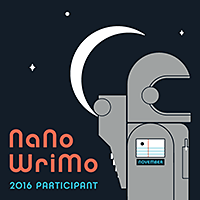
 I have a confession to make. On the outside I may seem like I’m a pretty laid-back person. I’m reasonably flexible, supportive of others, in tune with creativity. The kind of person who, when you drop a bowl in the kitchen and it shatters, will just laugh and laugh (after making sure no one is hurt) and grab the broom to clean up the mess.
I have a confession to make. On the outside I may seem like I’m a pretty laid-back person. I’m reasonably flexible, supportive of others, in tune with creativity. The kind of person who, when you drop a bowl in the kitchen and it shatters, will just laugh and laugh (after making sure no one is hurt) and grab the broom to clean up the mess.
But on the inside, I’m a little bit of a drama queen. I dyed my hair purple because brown is boring. I have an existential crisis when anyone questions my established opinions, whether or not I’m clearly right. And I require a looming deadline to get any work done.
Is it just me? Does anyone else feel this way?
Well, I’m not sorry about the hair, I kind of love it. I continue to work on being more flexible and seek to align my opinions, my priorities, my beliefs with what is true and life-affirming. And lucky for me, when it comes to deadlines, at least for the month of November I’ve got one really big one set to keep me on task.
NaNoWriMo is here!
Whether or not you’re a fan of NaNoWriMo (National Novel Writing Month), you have to agree it requires a deep and dedicated amount of energy and focus to sit down and write, to pull thoughts out of the air and put them in a coherent order on the page. I love NaNo because it gives my inner drama queen the impossible deadline she’s been dying to freak out over. 50,000 words in 30 days? That’s about as massive as you can get. It requires discipline with very little wiggle room in order to be successful. NaNo lights the fire underneath my creative muse and shakes her into action.
Recently, I wrote a post for DIYMFA listing five reasons that NaNoWriMo can make you a better writer. One my favorite reasons that I feel NaNo makes you better: it forces you to push your limits. I’d like to unpack that reason for a moment here.
It’s time for radical creativity
50,000 words in 30 days. That’s 1,667 words a day. Sure, Stephen King told you that you’re not a real writer if you don’t write at least 2,000 words a day. But I think we’ve all agreed we’ll follow that advice until it doesn’t work anymore. After that, you have to do what works for you, what is achievable and leaves you feeling successful and motivated to keep coming back to the page. In practical, everyday life, 2,000 words a day is just not feasible for most writers. Except for the month of November, when intrepid NaNoWriMo participants gather together and collectively commit to doing just that.
Writing 1,667 words a day for 30 days straight is definitely a challenge. It requires that you commit to sitting down each day for however long it takes to put those words on the page. It means that if you know in advance that you can’t make your words on a given day, you can plan ahead to ensure those words get written anyhow. And it means that if you fall off the wagon and miss a few days, you have to brush yourself off and do the math to figure out how to get back on track.
Beyond the practical, NaNo forces you to stretch out of your creative comfort zone. You will likely come to the page some days feeling an absolute void of inspiration. On those days, an act of radical creativity will be required. You’ll have to dive deep on those days and allow yourself to be raw and unrefined. Those kinds of days, while frustrating at first, will help to shape you as an artist. Instead of being ashamed of bumping up against your creative limits, use the opportunity to see just how much farther you can go.
Creativity is a lifestyle
You’re probably not going to keep the NaNoWriMo pace as part of your regular writing schedule. And that’s ok. The point of the experience is to ignite the spark of creativity within you, not so that it becomes a raging fire that consumes everything if it goes unchecked, but so that after the blaze of NaNo you can come back to the deep, slow burn of your every day. That slow burn is the actual goal of NaNoWriMo. The lump of words that form your manuscript draft is a byproduct of your creative life, something that you’ve been nurturing all year long.
You have a story in you. Sometimes it takes a radical act of creativity to bring it out.

 I ran 70 miles during the month of November. I also wrote 50,000 words of a novel. Both of those numbers are HUGE when you think about the average amount of running and writing I normally do. No, I don’t have super powers suddenly. I didn’t do it all at once. I took it a day at a time, followed a prescribed regimen, and when I wanted to quit I didn’t allow myself any wiggle room.
I ran 70 miles during the month of November. I also wrote 50,000 words of a novel. Both of those numbers are HUGE when you think about the average amount of running and writing I normally do. No, I don’t have super powers suddenly. I didn’t do it all at once. I took it a day at a time, followed a prescribed regimen, and when I wanted to quit I didn’t allow myself any wiggle room.
